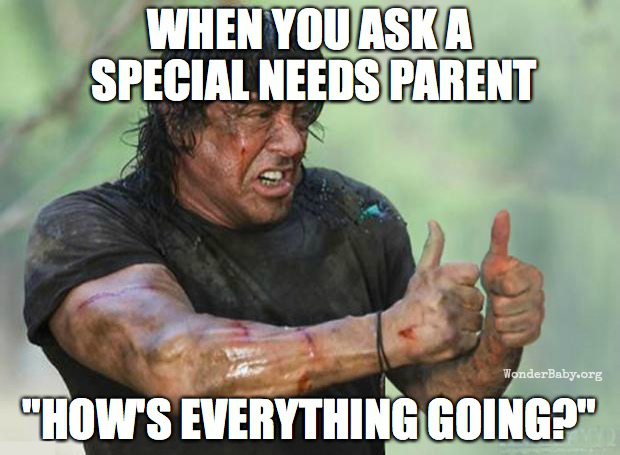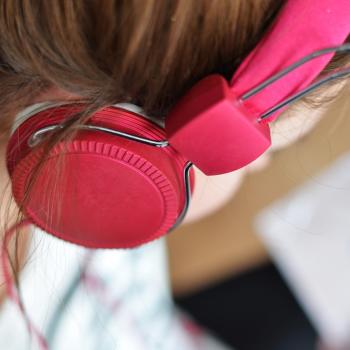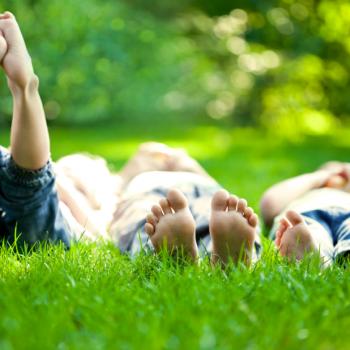Have you seen it on Facebook? The image of the “special-needs parent” who has just survived a battle, and when asked how things are going, gives two thumbs ups?

I smiled a little when I saw it the first time. It is summer break after all. And my son with level 3 (non-verbal) autism is not a fan of summer time. The lack of structure gives him anxiety. He doesn’t know what to expect, and he can’t control his schedule. So he bangs his iPad over his head over and over. He bangs the window in the car so hard we think it’s going to shatter. He hits himself in the head, and he hits me. I don’t end up bloody with a ripped shirt, but I do often have bruises. He has also decided that toilets are no fun but there are other places you can pee that are fun, so I’m on high alert, watching for him to pull down his shorts around the house, around the yard, in public, anywhere we go. So I get the humor in the picture. But I don’t think it’s funny.
There are three potential audiences who would see this meme if I shared it.
- First, fellow special-needs parents of course. And they would get it. But would they also think I’m trying to communicate my life is harder than theirs? Mommy wars are usually about whose kid is the smartest and most talented, but in the special-needs world, it’s often about which mommy is suffering the most. She gets the attention and sympathy. Is that my motivation for sharing?
- Second, parents of typical kids. They already think my life is hard or strange or a mystery. It may remind them how challenging my life is long enough to click the sad face as a Facebook reaction, but it doesn’t build our friendship. It doesn’t truly help them get to know me or my family. It sets us apart, and we don’t need any help with that.
- Third, people with disabilities. I’m Facebook friends with a variety of people, including adults with disabilities. I’ve learned from them, and I’ve been corrected by them. They don’t love when parents like me focus on how hard it is to raise kids like them. And although my younger son won’t be able to read memes I share on social media, some of the parents who are sharing it do have kids who will be able to see and understand. Just as parents of typical kids grow more aware of what they post as the kids grow older and see their social media histories, we need to be aware of the message we’re giving to our kids with disabilities (and their siblings) as well.
Social media isn’t good or bad. It’s a tool, and tools are neutral. But they can be used for good or bad. Social media has been very good for most special-needs parents. It provides community, encouragement, and even answers to problems we’re dealing with. But it can also be bad. We must choose to use it for good.
Therefore encourage one another and build one another up, just as you are doing. 1 Thes. 5:11
I don’t want to shame you if you saw it, laughed, shared it, and went on with your day. I understand the motivations behind sharing it. But I think we need to pause and think before we share anything, especially anything that could potentially hurt feelings or relationships.
Sandra Peoples is a pastor’s wife and mom to two boys. She’s the author of Held: Learning to Live in God’s Grip (a Bible study for special-needs parents) and the upcoming new release, Unexpected Blessings: The Joys and Possibilities of Life in a Special-Needs Family.













